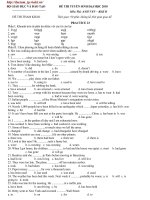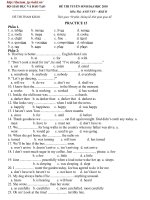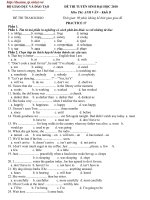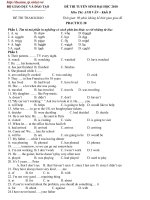LT cấp tốc Anh 2010 số 25
Bạn đang xem bản rút gọn của tài liệu. Xem và tải ngay bản đầy đủ của tài liệu tại đây (120.19 KB, 8 trang )
http://ductam_tp.violet.vn/
BỘ GIÁO DỤC VÀ ĐÀO TẠO ĐỀ THI TUYỂN SINH ĐẠI HỌC 2010
Môn Thi: ANH VĂN – Khối D
ĐỀ THI THAM KHẢO Thời gian: 90 phút, không kể thời gian giao đề
Read the following passage and mark the letter A, B, C, or D on your answer sheet to indicate
the correct answer to each of the questions from 1 to 10.
Psychologists have debated a long time about whether a child's upbringing can give it the ability
to do
outstandingly well. Some think that it is impossible to develop genius and say that it is simply
something a
person is born with. Others, however, argue that the potential for great achievement can be
developed. The
truth lies somewhere between these two extremes.
It seems very obvious that being born with the right qualities from gifted parents will increase a
child's ability
to do well. However, this ability will be fully realized only with the right upbringing and
opportunities. As one
psychologist says, "To have a fast car, you need both a good engine and fuel."
Scientists have recently assessed intelligence, achievement, and ability in 50 sets of identical
twins that
were separated shortly after birth and brought up by different parents. They found that
achievement was based
on intelligence, and later influenced by the child's environment.
One case involving very intelligent twins was quoted. One of the twins received a normal
upbringing, and
performed well. The other twin, however, was brought up by extremely supportive parents and
given every
possible opportunity to develop its abilities. That twin, though starting out with the same degree
of intelligence
as the other, performed even better.
This case reflects the general principle of intelligence and ability. The more favorable the
environment, the
more a child's intelligence and ability are developed. However, there is no link between
intelligence and the
socioeconomic level of a child's family. In other words, it does not matter how poor or how rich a
family is, as
this does not affect intelligence.
Gifted people cannot be created by supportive parents, but they can be developed by them. One
professor
of music said that outstanding musicians usually started two or three years earlier than ordinary
performers,
often because their parents had recognized their ability. These musicians then needed at least ten
years' hard
work and training in order to reach the level they were capable of attaining.
People who want to have very gifted children are given the following advice:
• Marry an intelligent person.
• Allow children to follow their own interests rather than the interests of the parents.
http://ductam_tp.violet.vn/
• Start a child's education early but avoid pushing the child too hard.
• Encourage children to play; for example, playing with musical instruments is essential for a
child who
wants to become an outstanding musician.
C©u 1: The upbringing of highly intelligent children requires ________
A. wealthy and loving parents B. an expensive education
C. good musical instruments D. parental support and encouragement
C©u 2: The word "others" used in the first paragraph refers to
A. other people B. other scientists C. other geniuses D. other children
C©u 3: When scientists studied intelligence and ability in twins, they found that______.
A. ability depends mainly on intelligence and achievement
B. different twins generally have different levels of ability
C. intelligence and development are irrelevant to ability
D. ability depends both on intelligence and on environment
C©u 4: Scientists chose twins for their study because______.
A. they have the same genetic background, usually with similar intelligence
B. they are born into the same family, hence the same upbringing
C. each twin has the same environment as his/her twin
D. they have the same economic background and hence the same opportunities
C©u 5: How were great musicians different from ordinary musicians in their development?
A. They concentrated on music to the exclusion of other areas.
B. Their ability was realized at an early stage and then nurtured.
C. They practice playing their instruments for many years.
D. They were exceptionally intelligent and artistic.
C©u 6: The writer advises that gifted children should be allowed to follow______.
A. only their interests in computer games B. their own interests
C. their parents' interests D. only their interests in musical instruments
C©u 7: When encouraging their gifted children, parents should avoid______.
A. permitting them to follow their own interests B. letting them play their own way
C. pushing their children too hard D. starting their education at an early age
C©u 8: The remark: "To have a fast car, you need both a good engine and fuel." in the passage
means that in
order to become a genius______.
A. you need intelligence and you need to develop it
B. you must nourish your brain and train your muscles hard
C. you need to have good health and good nourishment
D. you should try to move quickly and efficiently
C©u 9: The word "favorable" in the passage mostly means
A. "helping somebody to be more intelligent compared to other people"
B. "of high quality or an acceptable standard"
C. "good for someone and making him/ her likely to be successful"
D. "under the control or in the power of somebody else"
C©u 10: All of the following statements are true EXCEPT______.
A. studying different twins is a useful scientific procedure
B. To become successful, a child needs both native intelligence and development
C. educational development depends completely on economic well-being
http://ductam_tp.violet.vn/
D. a child's intelligence is influenced by that of his/ her parents
Read the following passage and mark the letter A, B, C, or D on your answer sheet to indicate
the correct answer to each of the questions from 11 to 20.
Quite different from storm surges are the giant sea waves called tsunamis, which derive their
name
from the Japanese expression for "high water in a harbor". These waves are also referred to by
the general
public as tidal waves, although they have relatively little to do with tides. Scientists often refer to
them as
seismic sea waves, far more appropriate in that they do result from undersea seismic activity.
Tsunamis are caused when the sea bottom suddenly moves, during an underwater earthquake or
volcano, for example, and the water above the moving earth is suddenly displaced. This sudden
shift of water
sets off a series of waves. These waves can travel great distances at speeds close to 700
kilometers per hour.
In the open ocean, tsunamis have little noticeable amplitude, often no more than one or two
meters. It is when
they hit the shallow water the coast that they increase in height, possibly up to 40 meters.
Tsunamis often occur in the Pacific because the Pacific is an area of heavy seismic activity. Two
areas of
the Pacific well accustomed to the threat of tsunamis arc Japan and Hawaii. Because the seismic
activity that
causes tsunamis in Japan often occurs on the ocean bottom quite close to the islands, the
tsunamis that hit
Japan often comes with little warning and can therefore prove disastrous. Most of the tsunamis
that hit the
Hawaiian Islands, however, originate thousands of miles away near the coast of Alaska, so these
tsunamis have
a much greater distance to travel and the inhabitants of Hawaii generally have time for warning
of their imminent
arrival.
Tsunamis are certainly not limited to Japan and Hawaii. In 1755, Europe experienced a
calamitous
tsunami, when movement along the fault lines near the Azores caused a massive tsunami to
sweep onto the
Portuguese coast and flood the heavily populated area around Lisbon. The greatest tsunami on
record occurred
on the other side of the world in 1883 when the Krakatoa volcano underwent a massive
explosion, sending
waves more than 30 meters high onto nearby Indonesian islands; the tsunami from this volcano
actually
traveled around the world and was witnessed as far away as the English Channel.
C©u 11: The paragraph preceding this passage most probably discusses
A. underwater earthquakes B. storm surges C. tides D. tidal waves
C©u 12: According to the passage, all of the following are true about tidal waves EXCEPT that
A. they're caused by sudden changes in high and low tides
B. they refer to the same phenomenon as seismic sea waves
C. they are the same as tsunamis D. this terminology is not used by the scientific community
http://ductam_tp.violet.vn/
C©u 13: The world "displaced" in the second paragraph is closest in meaning to..............
A. located B. filtered C. moved D. not pleased
C©u 14: It can be inferred from the passage that tsunamis ............
A. are often identified by ships on the ocean B. generally reach heights greater than 40 meters
C. are far more dangerous on the coast than in the open ocean
D. cause severe damage in the middle of the ocean
C©u 15: As used in the passage, water that is "shallow" isn't ..........
A. coastal B. deep C. clear D. tidal
C©u 16: A main difference between tsunamis in Japan and in Hawaii is that tsunamis in Japan
are more likely
to...........
A. come from greater distances B. be less of a problem
C. originate in Alaska D. arrive without warning
C©u 17: The possessive "their" in the third paragraph refers to .........
A. these tsunamis B. the inhabitants of Hawaii
C. the Hawaiian islands D. thousands of miles
C©u 18: A "calamitous" tsunami in the last paragraph is one that is .................
A. at fault B. expected C. disastrous D. extremely calm
C©u 19: From the expression "on record" in the last paragraph, it can be inferred the tsunami that
accompanied
the Krakatoa volcano ..............
A. might not be the greatest tsunami ever B. was not as strong as the tsunami in Lisbon
C. was filmed as it was happening D. occurred before efficient records were kept
C©u 20: The passage suggests that - the tsunami resulting from the Kr- volcano ..............
A. was unobserved outside of the Indonesian islands B. resulted in little damage
C. caused volcanic explosions in the English Channel
D. was far more destructive close to the source than far away
Mark the letter A,B,C or D on your answer sheet to indicate the correct word or phrase to fill
in
the blank in the following passage from 21 to 30.
Environmental Concerns
Earth is the only place we know of in the universe that can support human life(21)______ human
activities are making the planet less fit to live on. As the western world carries on consuming
two-thirds of the
world's resources while half of the world's population do so (22)______ to stay alive we are
rapidly destroying
the (23)______ resource we have by which all people can survive and prosper. Everywhere fertile
soil is
(24)______ built on or washed into the sea. Renewable resources are exploited so much that they
will never be
able to recover (25)______ We discharge pollutants into the atmosphere without any thought of
the
consequences. As a (26)______ the planet's ability to support people is being reduced at the very
time when
rising human numbers and consumption are (27)______increasingly heavy demands on it.
The Earth's (28)______ resources are there for us to use. We need food, water, air, energy,
medicines, warmth,
http://ductam_tp.violet.vn/
shelter and minerals to (29)______ us fed, comfortable, healthy and active. If we are sensible in
how we use the
resources they will (30)______ indefinitely. But if we use them wastefully and excessively they
will soon run out
and everyone will suffer.
C©u 21: A. Still B. Despite C. Yet D. Although
C©u 22: A. for B. just C. already D. entirely
C©u 23: A. lone B. individual C. lonely D. alone
C©u 24: A. sooner B. rather C. either D. neither
C©u 25: A. completely B. quite C. greatly D. utterly
C©u 26: A. result B. product C. development D. reaction
C©u 27: A. having B. doing C. taking D. making
C©u 28: A. natural B. real C. living D. genuine
C©u 29: A. stay B. keep C. maintain D. hold
C©u 30: A. last B. stand C. remain D. go
Mark the letter A, B, C or D on your answer sheet to show underlined part that needs
correction.
C©u 31: Drying food by means of solar energy is a ancient process applied wherever
A B C D
food an climatic conditions make it possible.
C©u 32: The examination will test your ability to understand spoken English, to read
A B
non technical language, and writing correctly.
C D
C©u 33: That man was an easy recognized figure with his long, whrite beard and wide brimmed
had.
A B C D
C©u 34: America’s first satellite exploded before it had risen three and a half feet off the ground.
A B C D
C©u 35: An itch resulting when a nerve that can carry pain is only slightly stimulated.
A B C D
Mark the letter A, B, C or D on your answer sheet to indicate the correct answer to each of the
following questions.
C©u 36: Your teacher is reading a book.You want to ask her a question.
You say: ____
A. I’m sorry, I ask you a question. B. Excuse me. May I ask you a question?
C. By the way, May I ask you a question? D. Hi, I’ll ask you a question.
C©u 37: He denied ____ the shop.
A. breaking on B. to break into C. having broken into D. to breaking
C©u 38: We’ll have to call the barbecue ____ .It’s going to rain.
A. for B. cross C. up D. off
C©u 39: She failed the test ____ she studied hard.
A. although B. even though C. A&B D. as
C©u 40: You ____ out yesterday without a coat. No wonder you caught a cold.
A. hadn’t gone B. haven’t gone C. shouldn’t have gone D. mustn’t have
gone
C©u 41: After a quick ____ at the patient, the doctor rang for an ambulance.









